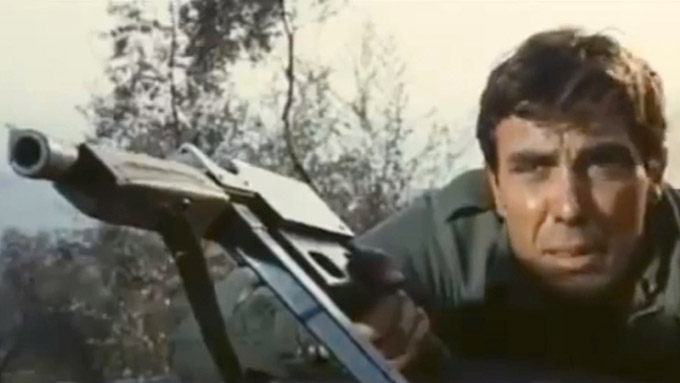The Last Mercenary is an odd 1968 action film, directed by Mel Welles, that’s frankly rather difficult to classify. It’s a little like a spy film, a little like a war film and mostly like a spaghetti western, albeit set in contemporary times in Brazil. This is partly due to the setting – the Spanish locations give it a very Spaghetti feel and it features many familiar performers from the genre – but also down to the plot, which is derived wholesale from many a sagebrush tale.
Ray Danton stars as Anderson, an ex-mercenary who is hired by De Largos (Jorge Rigaud), the owner of a Brazilian gold mine, to protect his land from saboteurs and ensure that a delivery of ore reaches its destination. Unfortunately, powerful forces are out to close down the operation, and despite Anderson’s best efforts it’s not long until De Largos been murdered.
Faced with an army of villains led by his old colleague, Steinmann (Carl Mohner) and the silent, enigmatic ‘Man in Black’ (Gunther Stoll), Anderson has no choice but to try and fight them off with only the assistance of his band of miners, who he has swiftly trained in the art of combat.
While hardly breaking down any cinematic barriers, The Last Mercenary is idiosyncratic and well made enough to stand as being a decent effort. Mel Welles directs with a steady hand, and there are some leftfield touches that stick in the mind: a freeform opening sequence, in which Danton wanders through assorted locations and there’s very little dialogue, before coming across a merry-go-round in the middle of nowhere, has a certain touch of the Jodorowsky about it.
There are also some very peculiar characters. Danton is a far from traditional protagonist. This is a very different film to Hello Glen Ward, House Dick, his previous collaboration with Welles, which was broadly comic whereas this is deadly serious, but they do both share a central character who is heroic by default. Pascale Petit (from Femmine carnivore) has a rather underdeveloped role as De Largos’s untrustworthy widow, and Gunther Stoll makes an impression as the flamboyant, mute, villain. Stoll was an underrated german actor who was a co-production favourite in the late sixties, but seemed to rather disappear in the following decade. Inma De Santis, who was to become a major Spanish child star, appears as a rather spooky little girl.
Unfortunately, this is rather difficult to track down nowadays. My copy was a Grey Market dupe of a Dutch Video and far from ideal, and the cinematography is good enough to indicate that it would benefit from a proper release. A final mention should also be made of Bruno Nicolai’s excellent soundtrack, which is available on CD.


La bellisima Inma de Santis (Inmaculada Santiago del Pino) falleció en un aciago accidente de tráfico en Marruecos.
Fotos de Inma en http://www.octopusmagnificens.blogspot.com
http://www.flickr.com/photos/octopusmagnificens/